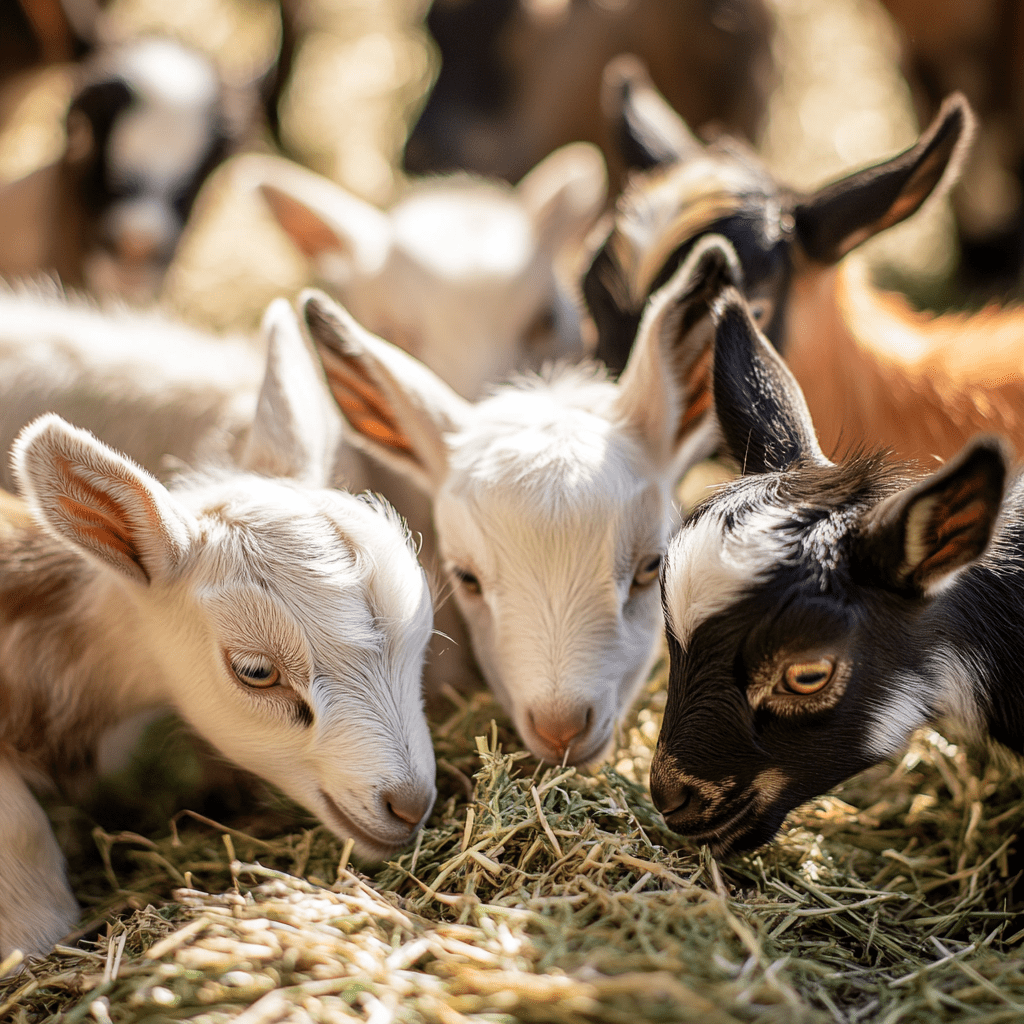Best Feed for Baby Goats: What to Feed Kids for Healthy Growth
Raising baby goats (kids) requires careful attention to their diet to ensure they grow up healthy and strong. From birth to weaning, proper nutrition is crucial for building a solid foundation for their overall well-being. In this article, we’ll cover everything you need to know about the best feed for baby goats, providing detailed guidance on what to feed kids at different stages of growth.
Why Proper Nutrition for Baby Goats Matters
Feeding baby goats isn’t just about helping them grow quickly—it’s about giving them the nutrients they need for strong bones, a healthy immune system, and good digestion. From colostrum in the first few hours of life to high-quality hay during weaning, every stage of feeding plays a significant role in their development.

Stages of Feeding Baby Goats
The nutritional needs of baby goats change as they grow. Let’s break down what to feed kids at each stage, from birth to weaning.
1. Colostrum (First 24 Hours)
- Importance: Colostrum is the first milk produced by the mother and is rich in antibodies, vitamins, and nutrients essential for the kid’s immunity and survival.
- Timing: Baby goats need colostrum within the first 24 hours of life, with the first few hours being the most critical.
- Quantity: Each kid should consume approximately 10% of its body weight in colostrum within this period.
2. Milk or Milk Replacer (0-8 Weeks)
- Mother’s Milk: If available, mother’s milk is ideal for baby goats. It provides balanced nutrition and promotes bonding.
- Milk Replacer: When mother’s milk is not an option, a high-quality goat milk replacer is the best alternative. Choose a product specifically designed for goats, as calf milk replacers may lack essential nutrients.
- Feeding Schedule: Baby goats typically need to be bottle-fed 3 to 4 times per day during their first month, then gradually reduce feedings as they approach weaning.
3. Introducing Solid Foods (1-3 Weeks)
- Creep Feed: Start introducing a high-quality creep feed (a specially formulated grain mix) around 1 week of age. Look for creep feed with at least 16-18% protein.
- Fresh Water and Hay: Make sure fresh water and good-quality alfalfa or grass hay are available at all times. Even though they’ll mostly rely on milk, introducing solid foods early encourages rumen development.
4. Weaning (8-12 Weeks)
- Gradual Transition: Weaning is a gradual process. Around 8 weeks, begin reducing milk feedings while increasing access to creep feed and hay.
- Balanced Diet: By the end of weaning, the diet should consist mostly of hay and creep feed, with minimal milk or milk replacer.
What to Look for in Feed for Baby Goats
When selecting the best feed for baby goats, here are the key factors to consider:
- Protein Content: High-protein feeds (16-18%) are essential for growth.
- Digestibility: Choose feeds that are easy to digest, especially in the early stages.
- Nutrient Balance: Look for feed mixes that provide balanced vitamins and minerals, particularly calcium and phosphorus for bone development.
- Palatability: Baby goats can be picky, so ensure the feed is appealing and tasty for them.
Chart: Feeding Schedule for Baby Goats
| Age (Weeks) | Feed Type | Frequency | Notes |
|---|---|---|---|
| 0-1 | Colostrum | Every 2-4 hours (first 24 hours) | Critical for immunity |
| 1-4 | Milk or Milk Replacer | 3-4 times per day | Gradually introduce creep feed |
| 4-8 | Milk/Milk Replacer + Creep Feed | 2-3 times per day | Increase solid food intake |
| 8-12 | Creep Feed + Hay | Free choice | Gradual reduction in milk feedings |
Table: Recommended Nutrient Composition for Creep Feed
| Nutrient | Recommended Percentage (%) |
|---|---|
| Crude Protein | 16-18% |
| Crude Fat | 3-5% |
| Crude Fiber | 10-15% |
| Calcium | 0.8-1.2% |
| Phosphorus | 0.4-0.8% |

Common Feeding Mistakes to Avoid
New goat owners sometimes make errors when feeding baby goats. Here are some common mistakes and how to avoid them:
- Overfeeding Milk: Too much milk can cause digestive problems, such as scours (diarrhea). Stick to the recommended quantities.
- Incorrect Milk Replacer: Using calf or lamb milk replacer instead of goat-specific milk replacer can lead to nutritional deficiencies.
- Rushing Weaning: Weaning should be gradual, not abrupt. A sudden transition can lead to stress and poor growth.
- Ignoring Fresh Water: Even when relying heavily on milk, always ensure fresh, clean water is available.
Conclusion: Building a Strong Foundation for Healthy Goats
Feeding baby goats properly from day one ensures they have the best start in life. By providing colostrum, high-quality milk, and introducing the right solid foods at the right time, you’re setting your goats up for healthy growth and development. Remember that the best feed for baby goats evolves as they grow, so adapt your feeding routine accordingly.
Stick to a well-balanced feeding plan, avoid common pitfalls, and watch your baby goats thrive!
Reference: https://en.wikipedia.org/wiki/Goat
